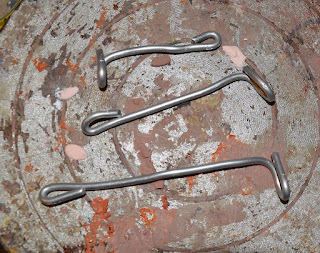Calm down, calm down -plants are cool too, especially if they're alien. It's not just about the monsters. Actually, there might be some fun tips and trick in here about how to use puppet-making materials to also make props, and props that you can animate at that.
I wanted some weird plants on the world of Tanagra. You're never shown how that planet looks in the Star Trek Next Gen episode on which my film is based. I will be using lots and lots of Photoshopped images of strange fungi, weird fruits and such, but I also wanted some plants that I could position for my own photography, as well as some I wanted to animate. Thus, the three aluminum wires above will form the very simple armatures for a bunch of strange growths.
To build up the basic shape of these plants I'm wrapping the wires with thin polyurethane foam.
After that I built up more detailed shapes using cotton dipped in latex. Pointy sculpting tools were used to press lines and wrinkles into the gooey material. Actually, one excellent thing about the cotton / latex mix is that it will create its own subtle textures as it dries. Small and very organic-looking bumps and wrinkles will appear naturally.
And here's how the finished three growths turned out. They're based on fungoid animals from Earth's primal seas. The plants are attached to a clump of Polymorph plastic, into which a wing nut is attached. I can then bolt this flexible prop down, and animate it to make it sway in the wind, for example.
The next plant is also growing in a clump. A bunch of aluminum wires wrapped with soft string make up the stems.
The string is covered with tinted latex -let's make `em pink. I'm only adding one layer of latex, so the string will still be visible and form a wrinkly texture.
The stems are attached to a block of Polymorph plastic with a wing nut at the base. The tops are small bits of rolled up paper with balls of cotton, all of it covered with latex. Here's the deal with these plants: They will be eaten by an animal, covered in my previous blog post, with a funnel mouth, and the tops will slide off the stems and fly into the critter's mouth. In other words, the tops come off easily for animation, but are also quite secure while stuck on the stems.
Another plant will be kind of palm tree-like, but will be swaying in the wind like an underwater plant billows back and forth. To create the branches / leaves I sculpted this simple shape in medium Monster Clay.
This dental plaster mold was made over the sculpture and with a pointy tool I added these sort of fern-like shapes, just dripping the tinted latex into the mold.
The dried latex leaves are pulled out of the mold and attached to aluminum wires covered with sewing string and tinted latex.
The trunk is yet another bit of aluminum wire, wrapped with polyurethane foam and a latex skin. The four leaves / branches are attached to the top with Polymorph plastic, and a wing nut foot keeps the plant stuck to my animation stage.
The last plant won't really be moving, except that I may animate it being uprooted in the fight between the beast and the heroes of the tale. I sculpted a trunk inspired by the look of a cycad.
Again, I've made a plaster mold from the sculpture into which I could cast a hollow latex skin. I filled this skin with a fast-setting plastic, and attached some flexible garden wires at the bottom along with my customary wing nut. The cone-looking thing at the top is simply cotton dipped in latex, with more tinted latex drops added over it.
That's it for the plants. I hope they'll all look good and weird when duplicated many times in After Effects, and help create a truly alien-looking landscape.













No comments:
Post a Comment